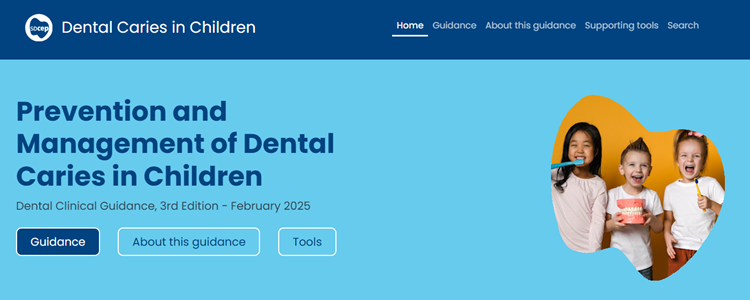New digital resource provides the latest clinical guidance on preventing and managing dental decay in children

New digital resource provides the latest clinical guidance on preventing and managing dental decay in children
Newly updated clinical guidance published today by NHS Education for Scotland’s (NES) Scottish Dental Clinical Effectiveness Programme (SDCEP) supports dental teams to improve and maintain the oral health of their younger patients. The third edition of Prevention and Management of Dental Caries in Children provides clear, practical recommendations and advice on the provision of dental care to prevent and, if necessary, manage dental decay in children.
The guidance is widely endorsed, both nationally and internationally, as a source of reliable, high-quality professional advice that promotes the provision of safe and effective oral health care for patients. Endorsing organisations include the British Society of Paediatric Dentistry, the British Society of Dental Hygiene and Therapy, the College of General Dentistry and the dental faculties of the UK Royal Colleges. Recognition by international organisations for paediatric dentistry and caries research demonstrates the wide applicability and reach of the guidance.
Professor of Paediatric Dentistry, Chris Deery, who co-chaired the guidance development group with Professor Nicola Innes, said:
“Poor oral health remains an issue for many children and has a significant impact on the child and their family. Untreated dental caries can result in pain and infection affecting quality of life, school performance and development. However, dental decay is largely preventable.
“The latest edition continues to emphasise the importance of caries prevention to benefit children and their families, avoiding the need for more complex interventions and contributing to more sustainable health care. We have updated the recommendations on caries prevention and have included advice on further options for caries management.”
Professor Karen Reid, NES CEO, said:
“SDCEP’s latest guidance makes a valuable contribution to the development of educational resources to support health and care professionals to deliver values-based care. I congratulate the members of the development group for their expertise and dedication.”
Professor Jan Clarkson, Associate Postgraduate Dental Dean for NES and director of SDCEP, added:
“We are delighted that this guidance is recognised across the UK and internationally as providing reliable, high quality professional advice. Notably, the International Association of Paediatric Dentistry acknowledges the emphasis on the importance of early intervention, prevention, and comprehensive care in managing dental caries in children, and believes that implementing the guidance recommendations will enhance children's oral health globally and promote best practice in paediatric dentistry.
“In addition, in line with the principles of values-based health and care, the guidance encourages shared decision-making and provides strategies for the dental team to support and empower children and young people (and their parents or carers) to take an active role in maintaining their oral health.”
Professor David Felix, Postgraduate Dental Dean and Director of Dentistry, NES, said:
“We welcome the publication of the new edition of Prevention and Management of Dental Caries in Children as a valuable resource for dental professionals in Scotland and beyond. SDCEP continues to support the delivery of oral healthcare which is safe, effective and person-centred by promoting new thinking and the adoption of research evidence into clinical practice."
The guidance builds on the success of the previous editions, which have been used extensively both in dental practice and as an educational resource in Scotland and in other countries. The guidance has been updated using SDCEP’s established methodology to take into account current research evidence, national policy and legislation, and is presented as a dedicated website (www.childcaries.sdcep.org.uk) with a summary ‘Guidance in Brief’ also provided.
Further information on the work of SDCEP is available at www.sdcep.org.uk
Contact: corpcomms@nes.scot.nhs.uk
February, 27 2025
